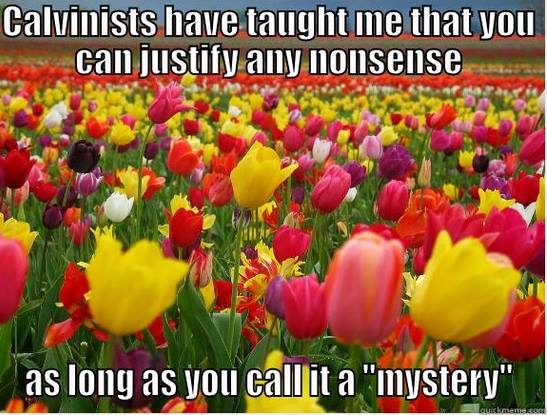Calvinism and Arminianism:
Myths & Realities
Sovereignty/Responsibility Tension:
Calvinists often say, “We know that sovereignty is true, and we know that human responsibility is true, and therefore since the Bible teaches both, and since the Bible cannot contradict itself, we know that both must be true, without being a condtradiction.”
But that is Circular Logic, because we don’t know that sovereignty is true, if sovereignty is defined to mean Determinism. So, Calvinists play with words, and you have to know what they really mean, when they use such terms, since “sovereignty” to a Calvinist means that God determines “whatsoever comes to pass,” rather than simply being the biblical concept of “dominion.” (Ephesians 1:21) So Calvinists, by their common expression, are assuming the very thing that they are trying to prove, and that is essentially Circular Reasoning. They are saying that they know that Hard Determinism is true, and yet we don’t know it, and in fact, it is very much challenged in Scripture, but the problem is that Calvinists don’t challenge their own presumptions and assumptions. Their own proof-texts go unchallenged as well.
Here is a sample of Calvinist quotes to demonstrate a reliance upon mystery:
Calvinist, Erwin Lutzer: “The revealed will was that all men be saved, but the hidden will was that the greater part of mankind be damned.” (The Doctrines That Divide, p.195, emphasis mine)
John Calvin: “So God in ordaining the fall of man had an end most just and right which holds the name of sin in abhorrence. Though I affirm that He ordained it so, I do not allow that He is properly the author of sin.” (Concerning the Eternal Predestination of God, p.123, emphasis mine)
Calvin: “I always affirm that the nature of man is at first created upright, lest the depravity which he contracted should be ascribed to God; and similarly that the death to which, though formerly the heir of life, he rendered himself subject proceeded from his own fault so that God cannot be considered its author.” (Concerning the Eternal Predestination of God, p.123, emphasis mine)
John Calvin: “From this it is easy to conclude how foolish and frail is the support of divine justice afforded by the suggestion that evils come to be not by His will, but merely by His permission. Of course, so far as they are evils, which men perpetrate with their evil mind, as I shall show in greater details shortly, I admit that they are not pleasing to God. But it is quite frivolous refuge to say that God otiosely permits them, when Scripture shows Him not only willing but the author of them.” (Concerning the Eternal Predestination of God, p.176, emphasis mine)
John Calvin: “To this opinion of this holy man I subscribe: in sinning, they did what God did not will in order that God through their evil will might do what He willed.” (Concerning the Eternal Predestination of God, p.123, emphasis mine)
As the solution, Calvin defers to mystery:
John Calvin: “If anyone object that this is beyond his comprehension, I confess it. But what wonder if the immense and incomprehensible majesty of God exceed the limits of our intellect? I am so far from undertaking the explanation of this sublime, hidden secret, that I wish what I said at the beginning to be remembered, that those who seek to know more than God has revealed are crazy. Therefore let us be pleased with instructed ignorance rather than with the intemperate and inquisitive intoxication of wanting to know more than God allows.” (Concerning the Eternal Predestination of God, p.123, emphasis mine)
John Calvin: “But now, removing from God all proximate causation of the act, I at the same time remove from Him all guilt and leave man alone liable. It is therefore wicked and calumnious to say that I make the fall of man one of the works of God. But how it was ordained by the foreknowledge and decree of God what man’s future was without God being implicated as associate in the fault as the author or approver of transgression, is clearly a secret so much excelling the insight of the human mind, that I am not ashamed to confess ignorance.” (Concerning the Eternal Predestination of God, pp.123-124, emphasis mine)
Calvinist. R.C. Sproul: “But Adam and Eve were not created fallen. They had no sin nature. They were good creatures with a free will. Yet they chose to sin. Why? I don’t know. Nor have I found anyone yet who does know.” (Chosen By God, p.31, emphasis mine)
The question is the answer.
An appeal to mystery is essentially an appeal to an extra-biblical authority, unless the Bible itself establishes that a mystery is involved. So Calvinists, therefore, are claiming an extra-biblical authority in order to resolve their logical contradictions. So when Calvinists infer a Secret Will, that is a claim to an extra-biblical authority. When Calvinists claim that Hard Determinism and Compatibilistic Free Will are resolved by mystery, that is a claim to an extra-biblical authority. When Calvinists claim that “all men” and “world” means only Calvinism’s elect, that is a claim to an extra-biblical authority. That is not “rightly dividing Scripture,” but rather, adding to it, an extra-biblical authority that is their own. So where did Calvinists get such authority?
Calvinist, Charles Spurgeon: “…we must pry into forbidden things, and uncover that which is concealed.” (Salvation by Knowing the Truth)
So this becomes the moral justification to assert a “mystery” whenever one’s theology is contradicted by Scripture. Calvinists often do this. Another example is when Calvinists try to deflect criticism over Calvinism being fatalistic, involving favoritism and making God out to the author of sin, resulting in references to free-will being “man-centered theology.”
Charles Spurgeon: “Now, God sometimes shuts the door, and says, ‘My child, it is so: be content to believe.’ ‘But,’ we foolishly cry. ‘Lord, why is it so?’ ‘It is so, my child,’ he says. ‘But why, Father, is it so?’ ‘It is so, my child, believe me.’ Then we go speculating, climbing the ladders of reasoning, guessing, speculating, to reach the lofty windows of eternal truth. Once up there we do not know where we are, our heads reel, and we are in all kinds of uncertainty and spiritual peril. If we mind things too high for us we shall run great risks. I do not intend meddling with such lofty matters. There stands the text, and I believe that it is my Father’s wish that ‘all men should be saved, and come to the knowledge of the truth.’ But I know, also, that he does not will it, so that he will save any one of them, unless they believe in his dear Son; for he has told us over and over that he will not. He will not save any man except he forsakes his sins, and turns to him with full purpose of heart: that I also know. And I know, also, that he has a people whom he will save, whom by his eternal love he has chosen, and whom by his eternal power he will deliver. I do not know how that squares with this; that is another of the things I do not know.” (Salvation by Knowing the Truth, emphasis mine)
Who said that God is shutting a door? The real problem is that Spurgeon has embraced his presumptions to Calvinism, and now he doesn’t know what to do with a verse that contradicts it, and so naturally, “It’s a Mystery!” God desires all men to be saved on the condition that they believe in His Son. That’s no great mystery. But a problem arises when he tries to fit Calvinism into the equation, and he just cannot bring himself to question Calvinism. The problem is this: When a person is determined to reject the truth, the first step is to muddy the waters: “Well, it’s a mystery.” “I know that Calvinism is true. Of that, there is no doubt, so this text must be teaching something that mankind is not supposed to know, and therefore I’m ok with not knowing it.” But maybe there is no mystery, and Calvinism is just wrong. Why don’t Calvinists want to question Calvinism? Answer: Because it is something they like...a lot.
Arminian, Jerry Walls: “Of course, this is not to deny that divine truth contains mysteries that elude our understanding. But mysteries are very different from logical contradictions. It isn’t a sign of true piety for one to be willing to dispense with logical coherence in the name of mystery.” (Why I Am Not A Calvinist, p.156, emphasis mine)
Arminian, Keith Schooley: “Mysterion, in the NT, is used for something which God had previously kept hidden, until He chose to reveal it (as in, for instance, His intention that Jews and Gentiles would be brought together as one people of God, Eph. 3:6). It is something like a plot twist in literature. It is not necessarily difficult to fathom; it is just unexpected, something God chose to keep hidden for a time. But ‘mystery’ in theology is frequently used for something unfathomable, beyond human comprehension, understandable only to God. In practice, it is used to deal with a logical contradiction within one’s theology. How can God ordain sin and yet not be its author? It’s a mystery. How can He desire the salvation of all and yet ordain that most of humanity remain condemned? It’s a mystery. How can He be utterly good and yet ordain actions that are utterly evil? It’s a mystery. It’s all too convenient. A true mysterion awaits an apokalypsis, a revelation of God’s purpose. It’s not an all-purpose escape clause for when you’ve ground your theology into self-contradiction.” (The Schooley Files, emphasis mine)
One person comments: “To say that God hates sin while secretly willing it, or to say that God warns us not to fall away though it is impossible, or to say that God loves the world while excluding most people from an opportunity for salvation, or to say that God warmly invites sinners to come to Him, knowing all the while that they cannot possibly do so—such things do not deserve to be called mysteries when that is just a euphemism for nonsense.”
One member of The Society of Evangelical Arminians: “Calvinists define terms as they please. So, by definition, God is just and God is love, no matter how God’s actions appear to others. God consigns some to Hell and others to glory; seems unjust and unloving to us but since God is loving and just by definition, things are not what they appear. It’s a mystery! God’s ways are not our ways! Whenever they get into a jam, it’s mystery all the way down.”
Arminian Charge: Calvinists too often rely on “mystery” to defend their positions.
Myth or Reality: Calvinists acknowledge a “Sovereignty/Responsibility Tension,” in which God determines whatsoever comes to pass, and yet man is responsible for what is exclusively determined for him to irresistibly think and to perform, for all eternity. For the Arminian, predestination refers to all that God does, which He planned in advance, while for the Calvinist, predestination means that God does everything. So this naturally creates a quandry for the Calvinist, when having to explain the existance of evil, and Calvinists heavily nuance the meaning of Determinism, by invoking such terms as “Compatibilism.”

